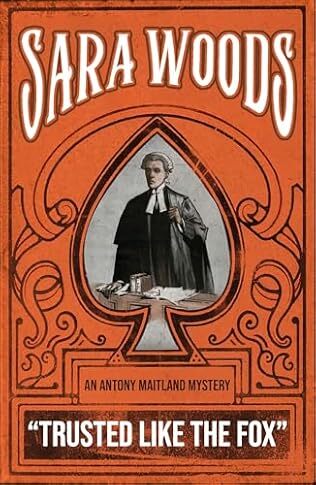Trusted Like The Fox

A review of Trusted Like the Fox by Sara Woods – 250312
Antony Maitland, Sara Woods’ series barrister and sleuth, has now become a Queen’s Counsel and Trusted Like the Fox, originally published in 1964 and reissued by Dean Street Press, sees him embroiled in a tricky case. Perhaps echoing Oscar Wilde’s famous comment about fox hunting, the pursuit of the uneatable by the indefensible, his case appears to be the defence of the indefensible by those all at sea. The book’s title, more appositely, is taken from Shakespeare’s Henry IV Part 1, “for treason is but trusted like the fox”.
Maitland’s client and the defendant is a man who claims to be Michael Godson, a man who for many years had lived a blameless life as a photographer. The case against him, though, that he really is Guy Harland, who brutally assaulted his boss, Doctor Fraser, stole some vital papers, although the experiments were not complete, escaped from arrest by assaulting a police constable, and then went over to Germany, where the experiments were completed and the resultant chemical which induced a form of cholera was used to massacre 4,000 people in the Polish town of Dubenoz.
Maitland’s initially line of attack is that the defendant really is Michael Godson and that the case is reminiscent of the experiences of one Adolf Beck, a man who was convicted twice for crimes he did not commit on the unreliable evidence of mistaken witnesses, a reference that the foreman of the jury, more of him anon, preens himself over picking up. Midway through the trial Godson pulls the rug from under his brief’s feet by admitting that he really is Guy Harland.
The sensible thing would have been for Maitland to give up the case at this point but something tells him that Harland is innocent and that he was set up at Burnham Towers by one or more of his colleagues on a night in October 1942. His focus is now to prove that this was the case and give a credible explanation of what really happened.
It is a case that involves the whistling of Schubert’s Serenade, a misplaced cigarette case, a woman who is besotted by her lover, and a crucial change of evidence given off stage by a witness in Maitland’s chambers, fortunately also in front of Maitland’s opposing brief, Paul Garfield. The witness, though, is unable to present their revised testimony before Justice Conroy as they are inconveniently murdered, their body found strangled. However, their signed testimony is accepted by Garfield and the case against Harland collapses as a new traitor is identified.
Throughout the case Maitland appears to be fighting against an irresistible tide of evidence and supposition but, strangely, is somewhat bored by the whole process, perhaps a reflection of the monumental and forlorn task in front of him. As the position becomes clearer he is more enthused and brings the case to a satisfactory conclusion with his customary insight and vigour.
I am not a great fan of courtroom dramas, they have a tendency to be a tad dull in the wrong hands, but there is enough in this case, one that marries a natural dislike of treason with an abhorrence of war atrocities, to keep the reader interested. One stylistic flourish Woods uses to good effect is at various points of the trial is to give some insight of the thoughts of some of those present, not least the foreman of the jury who is relishing the opportunity to play his part and demonstrate his superiority over his fellow jurors. Strangely, as the tide turns and the pace picks up, she abandons this ploy. I would have loved to have known what the foreman thought about the way things turned out.
Maitland, although very much on his own, has his formidable uncle, Sir Nicholas, to use as a somewhat querulous sounding board, and the ever faithful Jenny, his wife, is their to give him support and to soothe his fevered brow. With this formidable support team there was never any doubt that Maitland, as usual, would see that justice is done.
Let’s hope some more of his adventures see the light of day again sometime soon.



